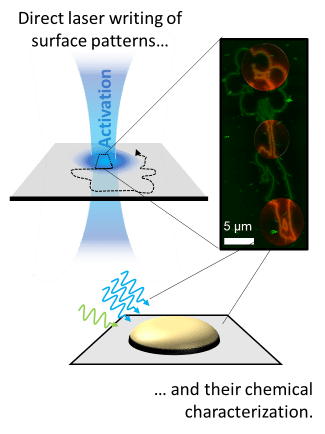Stage M2 (thèse possible)
Écrire la chimie avec la lumière : caractérisation chimique des surfaces fonctionnelles microstructurées
Context and Goals. Addition of organic functions onto surfaces through light induced procedures is a promising methodology to design functional surfaces with minimal usage of reactants. Direct laser writing methodologies, in particular, enable the creation of local layers with excellent temporal and spatial resolutions, while enabling extreme conditions to be achieved with relatively simple instrumentation.
Methodologies for analyzing such local reactions are however scarce, limiting our understanding of the nucleation, growth and stability of organic layers onto surfaces. This generates an urgent need for the development of analytical methodologies for investigation of local kinetics in operando conditions.
Over the past few years, our group has given important steps towards this goal, developing new non-invasive optical strategies to enable in situ characterization of surface modification kinetics with high precision (<1nm, 5 attoL) and diffraction limited resolution. We now seek to combine such in situ kinetic information with local characterization of the chemical properties of the layers, paving the way for holistic descriptions of the surface modification process. In particular, we are interested in the identification and characterization of unexpected intermediates, and on the optimization of imaging methodologies for the elucidation of the resulting layers chemical structure and elucidation of the nature of the chemical bonds between the layers and the underlying surfaces. For that, a combination of in situ vibrational spectroscopy, photoluminescence and optical microscopy methods will be combined with ex situ or inline methodologies. Short national mobility to access national characterization platforms are expected over the course of the internship.
Profile. Candidates are expected to have a background in physical chemistry and/or microscopy. Experience with analytical methods would be a plus. The intern will be formed in numerous surface analysis methodologies
This work will pave the way to the analysis of complex surface modification strategies with advanced photoelectrochemical or plasmonic methods, for which PhD funding has been secured (ANR). Therefore continuation of the internship into a PhD degree is possible upon mutual agreement.
Pour plus d'informations contactez : Fabien Miomandre et Vitor Brasiliense
